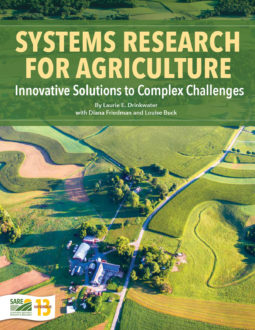In this handbook, we hope we have laid out in clear and simple terms the best information available on how to conduct agricultural systems research—from basic agricultural systems theory and background, to building collaborative teams, to designing and analyzing research projects.
For every bit of information we have provided, however, there is much more to learn, so please keep the following points in mind:
- Agricultural systems research is an emerging methodology, and new techniques and approaches are developed every day. Stay up to date on the literature and keep an ear out for innovations from the field, including those from farmers and extension. Consider publishing papers on methods that have worked well in your project if they are not already covered in the literature!
- Certain aspects of systems research are applicable across experiments, but each systems experiment is unique, including its boundaries, team composition, questions asked, data analyzed and final integration of results.
- As you build teams of researchers, farmers and other stakeholders, consider if the project could best be carried out by a well-balanced team of biophysical and social scientists. If so, spend some time at the very beginning recruiting across the biophysical–social divide. If your group represents only biophysical disciplines, reach out to social scientists and food system theorists. Conversely, if you are a group of social scientists, consider how you could address ecological and environmental aspects by recruiting biophysical expertise.
- Explore SARE resources at sare.org, which contains a vast database of projects, reports and papers summarizing SARE-funded work. Many projects under the Research and Education category have involved multidisciplinary and interdisciplinary research teams with a large array of stakeholders.
- Explore other funding sources for agricultural systems research, such as those mentioned in the introduction of this manual.
Agricultural systems research can be rewarding on many levels. Because every project is unique, there may be no direct precedent for the challenges you encounter, so it will be up to you and your team to find a solution. You will have the opportunity to improve your management and teamwork skills, and you will likely learn a great deal by collaborating with partners from other disciplines and professions. Agricultural systems research is a powerful method for solving complex problems and revealing innovative farming techniques that can have a profound impact on farmers, society and the environment. By establishing or joining a systems-oriented project, you are embarking on a true journey of discovery in both your research and your professional career.
We firmly believe that reading this book is the first bold step toward making meaningful changes in how you approach research and partnerships. As they say, the rest is up to you.
